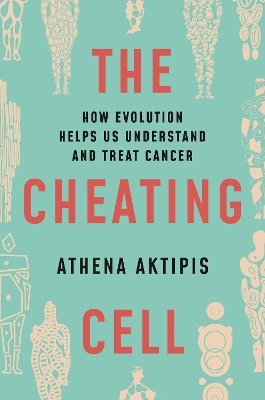
The Cheating Cell
How Evolution Helps Us Understand and Treat Cancer
Seiten
2021
Princeton University Press (Verlag)
978-0-691-21219-7 (ISBN)
Princeton University Press (Verlag)
978-0-691-21219-7 (ISBN)
A fundamental and groundbreaking reassessment of how we view and manage cancer
When we think of the forces driving cancer, we don’t necessarily think of evolution. But evolution and cancer are closely linked because the historical processes that created life also created cancer. The Cheating Cell delves into this extraordinary relationship, and shows that by understanding cancer’s evolutionary origins, researchers can come up with more effective, revolutionary treatments.
Athena Aktipis goes back billions of years to explore when unicellular forms became multicellular organisms. Within these bodies of cooperating cells, cheating ones arose, overusing resources and replicating out of control, giving rise to cancer. Aktipis illustrates how evolution has paved the way for cancer’s ubiquity, and why it will exist as long as multicellular life does. Even so, she argues, this doesn’t mean we should give up on treating cancer—in fact, evolutionary approaches offer new and promising options for the disease’s prevention and treatments that aim at long-term management rather than simple eradication. Looking across species—from sponges and cacti to dogs and elephants—we are discovering new mechanisms of tumor suppression and the many ways that multicellular life-forms have evolved to keep cancer under control. By accepting that cancer is a part of our biological past, present, and future—and that we cannot win a war against evolution—treatments can become smarter, more strategic, and more humane.
Unifying the latest research from biology, ecology, medicine, and social science, The Cheating Cell challenges us to rethink cancer’s fundamental nature and our relationship to it.
When we think of the forces driving cancer, we don’t necessarily think of evolution. But evolution and cancer are closely linked because the historical processes that created life also created cancer. The Cheating Cell delves into this extraordinary relationship, and shows that by understanding cancer’s evolutionary origins, researchers can come up with more effective, revolutionary treatments.
Athena Aktipis goes back billions of years to explore when unicellular forms became multicellular organisms. Within these bodies of cooperating cells, cheating ones arose, overusing resources and replicating out of control, giving rise to cancer. Aktipis illustrates how evolution has paved the way for cancer’s ubiquity, and why it will exist as long as multicellular life does. Even so, she argues, this doesn’t mean we should give up on treating cancer—in fact, evolutionary approaches offer new and promising options for the disease’s prevention and treatments that aim at long-term management rather than simple eradication. Looking across species—from sponges and cacti to dogs and elephants—we are discovering new mechanisms of tumor suppression and the many ways that multicellular life-forms have evolved to keep cancer under control. By accepting that cancer is a part of our biological past, present, and future—and that we cannot win a war against evolution—treatments can become smarter, more strategic, and more humane.
Unifying the latest research from biology, ecology, medicine, and social science, The Cheating Cell challenges us to rethink cancer’s fundamental nature and our relationship to it.
Athena Aktipis is associate professor in the Department of Psychology and at the Arizona Cancer Evolution Center at Arizona State University and cofounder of the International Society for Evolution, Ecology and Cancer. She is also the host of the science podcast Zombified and the producer of Channel Zed. Twitter @AthenaAktipis
| Erscheinungsdatum | 16.09.2021 |
|---|---|
| Zusatzinfo | 19 b/w illus. |
| Verlagsort | New Jersey |
| Sprache | englisch |
| Maße | 133 x 203 mm |
| Themenwelt | Medizin / Pharmazie ► Medizinische Fachgebiete ► Mikrobiologie / Infektologie / Reisemedizin |
| Medizin / Pharmazie ► Medizinische Fachgebiete ► Onkologie | |
| Studium ► 2. Studienabschnitt (Klinik) ► Humangenetik | |
| Naturwissenschaften ► Biologie ► Evolution | |
| Naturwissenschaften ► Biologie ► Humanbiologie | |
| ISBN-10 | 0-691-21219-8 / 0691212198 |
| ISBN-13 | 978-0-691-21219-7 / 9780691212197 |
| Zustand | Neuware |
| Informationen gemäß Produktsicherheitsverordnung (GPSR) | |
| Haben Sie eine Frage zum Produkt? |
Mehr entdecken
aus dem Bereich
aus dem Bereich
Die revolutionäre Medizin von morgen (Lifespan)
Buch | Softcover (2020)
DuMont Buchverlag
CHF 22,40
Eine sehr persönliche Geschichte | Der New York Times-Bestseller
Buch | Softcover (2023)
Ullstein Taschenbuch Verlag
CHF 30,75
Buch | Softcover (2022)
John Wiley & Sons Inc (Verlag)
CHF 169,95


